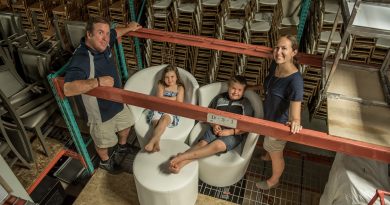April 5 COVID-19 update: Record numbers, Etches’ plea for staying home, Two million doses arrive this week
Special to WC Online
OTTAWA – Ottawa Public Health’s (OPH) supply of COVID-19 is growing but so is the city’s number of confirmed cases as the effects of the third wave continue to trend up.
OPH reports 237 new cases of the novel coronavirus today, (April 5), with one new death due to COVID-19.
Thanks to shipments of 8,100 Moderna vaccine doses and 11,200 AstraZeneca doses on Sunday, April 4, the city has received 193,710 doses, with 82 per cent of those administered.
The AstraZeneca vaccines are expected to be used at local pharmacies for residents over 55.
The new death brings Ottawa’s pandemic toll to 468.
Local hospitalizations due to the virus are up to 53 today, with 16 patients in intensive care. Acute care beds are 97 per cent full across Ottawa’s healthcare system, while intensive care beds are at 75 per cent capacity and ICU ventilator beds are at 33 per cent. Medical officer of health Dr. Vera Etches says hospitals have had to again postpone some non-emergency medical procedures for some patients, as staff members are forced to tend to current COVID-19 patients, testing centres and vaccination sites.
Indicators of COVID-19 transmission continue to trend in the wrong direction, locally Ottawa’s weekly incidence rate is at 119.1 per 100,000 residents, while residents being tested for COVID-19 are seeing positive results 7.5 per cent of the time.
There are still 29 healthcare institutions dealing with COVID-19 outbreaks today, along with seven schools and two childcare centres. Five community outbreaks are being tracked by OPH, one linked to a social event and four stemming from workplaces.
There have been 18,260 lab-confirmed cases of COVID-19 in Ottawa since March of 2020 (1,212 in the last week alone), with 15,977 resolved. OPH says it knows of 1,815 cases of COVID-19 in the community as of Monday.
CHEO researcher says UK variant five times more infectious
OTTAWA – Children’s Hospital of Eastern Ontario researcher Dr. Tyson Graber says a new variant in Ottawa is five times more infectious.
“We’re certainly in a wave right now and not even at the top yet,” Graber said in an earlier radio interview today (April 5).
Graber has been analyzing Ottawa’s wastewater for the past year, to evaluate COVID-19 levels and determine when residents can expect to see rises in community transmission.
He explains the latest round of wastewater testing signals the COVID-19 UK variant has arrived in the city and has the potential to put incredible strain on the healthcare system because it’s so easily transmissible.
“Cases are shooting up quite quickly and those cases are also UK variant, so this is essentially a new disease,” Graber said.
On the clinical side of things, Dr. Graber adds that a greater number of people contracting the variant seem to be ending up in hospital as it’s hitting residents harder than the original COVID-19 strain.
Dr. Etches implores residents to stay home amidst rising cases
OTTAWA – Ottawa’s medical officer of health is reminding residents to stay home, unless for essential reasons, as the COVID-19 situation in the capital deepens.
Ottawa moved into the red-control tier of the province’s COVID-19 response framework on March 19, but Dr. Vera Etches says since then, the COVID-19 curve only risen.
“Two weekends ago we had lovely weather and a lot of socializing,” Etches released in a statement on social media today (April 5). “I am seeing many people test positive after being in groups at restaurants, with transmission even outdoors. Ottawans, we moved into the Red zone as COVID-19 levels were rising 2 weeks ago and the curve has only worsened. Two weekends ago we had lovely weather and a lot of socializing. I am seeing many people test positive after being in groups at restaurants, with transmission even outdoors.”
On Saturday (April 3), Ottawa Public Health confirmed a record-high 240 new cases of the novel coronavirus, while Sunday saw an additional 198 confirmed cases.
The province issued a 28-day shutdown on Saturday, which closed gyms, personal care services and restaurant dining (indoor and outdoor).
“We have to stay home,” Etches said.
She explains, there aren’t enough vaccines to protect everyone from this COVID-19 resurgence, and the virus is currently, “spreading too fast in Ottawa to enable health services to function well.”
Etches says variants are driving this latest spread, which is leaving older adults vulnerable to hospitalization and death.
Two million vaccinations arrive in Canada this week
CANADA – More than two million doses of vaccines are set to arrive in Canada this week as the country scrambles to contain the wildfire spread of more contagious variants of the COVID-19 virus.
That includes the first batch of Oxford-AstraZeneca vaccines, 316,800 doses, to be sent to Canada from the global vaccine-sharing initiative known as the COVAX Facility.
Canada contributed $440 million to COVAX, half to secure up to 15 million doses of vaccines for Canada and half to buy vaccines for poorer countries that can’t afford to purchase their own.
While any member country can draw on COVAX’s supplies for its own use, Canada has been heavily criticized for undermining the spirit of the COVAX initiative, which is to ensure vaccines are equitably distributed to poor countries.
In addition to the COVAX supply, Canada is to receive 1,019,070 doses of the Pfizer-BioNTech vaccine and 855,600 doses of the Moderna vaccine over the next week.
Almost 2.2 million doses in total, following more than three million doses received last week.
By the end of the first quarter, Canada received a total of 9.5 million doses — ahead of the six million originally promised by the federal government despite production disruptions that slowed vaccine supply to a trickle in February and early March.
In the second quarter, Canada is set to receive at least one million doses of the Pfizer vaccine every week until the end of May, ramping up to two million a week in June.
It is on track to receive a total of 44 million doses of the Pfizer, Moderna and AstraZeneca vaccines by Canada Day.
The federal government is promising every Canadian who wants to be inoculated against COVID-19 will be fully vaccinated by the end of September.
The vaccination ramp-up comes as COVID-19 cases are skyrocketing across the country.
Canada passed a grim milestone Saturday, recording more than one million cases of COVID-19 since the virus hit the country in January last year. As of midday Sunday, 23,043 Canadians had died from the disease.












